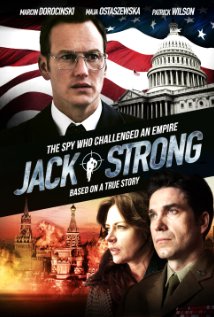
JACK STRONG
Poland, 2014, 128 minutes, Colour.
Marcin Dorocinski, Maja Ostaszewska, Patrick Wilson, Dagmara Dominczyk.
Directed by Wladyslaw Pasikowski.
Jack Strong is the codename for a Polish military official who became disillusioned with the influence of the Soviet Union, its intentions of attack on the west, and who made contact with American authorities to pass on classified information.
This is a Polish film, with the 21st century Polish perspective on the role of Poland as part of the Soviet Union, of its being caught up in Russian aggression during the Cold War. It appears early in the film that the protagonist, Jack Strong, is being interrogated by Communist officials, only for the audience to find out at the end that he is being debriefed by American authorities, reflecting on the consequences of his being accepted by the West and the mysterious death of his sons, indicating that while the Cold War might be over, there are still repercussions.
The action of the film opens in the 1960s and continues through to the 1990s in terms of espionage. Marcin Dorocinski plays the Polish official, something of an expert in the preparation of strategies, to the amazement of some of his superiors. Because he is so skilled, he is not suspected when he decides to make contact with the Americans, especially in the form of diplomat Patrick Wilson who vouches for his being authentic and as a contact point for the passing on of documents, noting the developments in technology, especially cameras, and a camera in a cigarette lighter, while there are still the traditional dropping off points with chalk markings in fences along the street.
The film shows the American discussions, some initial wariness, the testing of the reliability of the informant, an appreciation of the material that he communicated.
With his domestic life in Poland, his wife begins to suspect that he is having an affair, but learns, when he decides that he must move away from Poland, take his wife and their two sons, that greater stakes are involved.
There is some tension in the escape, Polish authorities watching the wrong house, suspecting the wrong person, yet a crisis at the East German border, the family being hidden in the back of the truck driven by a black American. They do escape.
An interesting, if sometimes sombre, espionage drama.
1. The background of the Cold War? The Soviet Union? The place of Poland? Espionage? The 20th century into the 21st century?
2. Poland, its war experience, the Soviet domination, totalitarianism, the role of Russia? Plans to invade Western Europe? The policies of the hawks in the East? The decades passing, the emergence of Solidarity, changes, the collapse of the Soviet empire?
3. The films settings, from the 1960s to the 1980s? Poland, the city, drab, the military, officials? The contrast with the US and Washington? Ordinary life in the Polish city? The atmosphere or for espionage? The musical score?
4. The interrogation of the officer, his age, appearance, the audience assuming that it was Polish Communists doing the interrogation, the questions, the reference to the death of his son, his motives? The end, discovering that it was an American interrogation and praise for him and his work as an agent?
5. The character of Jack Strong, the title, his codename, details of his work, his family life, even his wife suspecting a mistress? His colleagues, his skills, the offer of the strategies, his quick rise in the military? Ideological problems? Wariness of Russia?
6. The cases that he was involved in, the plan in the 1960s, transition to the 1968 and invasions, Vietnam, the Jimmy Carter era, fear of Brezhnev? Ideology and plans? The setting up of contacts, rendezvous points, signals?
7. The American discussions, the American agent, going to Poland to test the sincerity, approving, the quality of documentation handed on, the other agents, especially the woman in Poland? Her participation in the collecting of material? The meetings, the cigarette lighter and the camera?
8. The taking of the documents from the office, the collapse, the papers collected, his being safe?
9. The Russians and the Poles aware of the leak, the meetings, the suspects?
10. The reaction of the Americans, urging him to go slow in communication? To preserve his position?
11. The years passing, his decision that it was time to leave, covering his family, the plan, the various spies, coming to his house, in the street, the car chase, the wrong suspects?
12. The family, the young son, the background of his being summoned when the boy was in a drunken accident? The car, going to East Berlin, Checkpoint Charlie? The African- American driver, suspicions at the border, the warnings, not opening the crates, diplomatic immunity, the messages coming from Poland – and the border guards making a mistake?
13. The tradition of films about espionage in this era – this film as a Polish perspective, and from the retrospective the 1990s, fall of the Soviet Empire, Poland in NATO – and later part of the European Union?